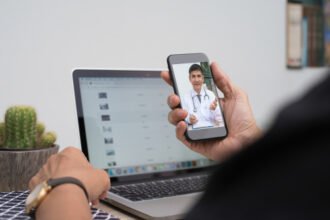 Healthcare professionals deal with sensitive patient information on a daily basis.
Healthcare professionals deal with sensitive patient information on a daily basis.
 Healthcare professionals deal with sensitive patient information on a daily basis. Under the Federal HIPAA guidelines, it is the duty of medical professionals to keep patient information and records secure. In the modern age of technology, however, keeping electronic health records protected takes a concerted effort.
Healthcare professionals deal with sensitive patient information on a daily basis. Under the Federal HIPAA guidelines, it is the duty of medical professionals to keep patient information and records secure. In the modern age of technology, however, keeping electronic health records protected takes a concerted effort.
Here are 7 things to keep in mind to improve your office’s EHR security.
Avoid Installing Too Many Programs
Computers that handle sensitive health information should only have verified applications that are designed to help medical professionals do their work. The more unauthorized programs that are installed on work computers, the more likely it is that a security breach will happen. Always perform sufficient research to find out about every program that you install on computers in your facility.Set Strong Passwords
Never use easy to guess passwords that everyone at your facility will know. Instead, each computer should have a unique password that only pertinent staff members are informed of. Make sure that you use a sufficient combination of upper and lower case letters as well as numbers and alphanumeric characters, which will help make your passwords harder to crack and improve your EHR security.Be Mindful Of Unattended Devices
Whether your facility uses laptops or workstations, make sure that they are locked sufficiently when your staff is done using them. Also remember to think about printers, copiers, and fax machines. You should never leave sensitive patient information on these machines.Try To Minimize Data On Devices
This concept can be tough for some medical professionals to grasp because it is a relatively new one. When data is left on individual devices like hard drives or flash drives, there is a bigger chance that it will be stolen or compromised. To improve EHR security, try to keep all sensitive patient records stored in the cloud or at one central location that you know is safe.Make Your Policies Known
Instilling security policies to improve your EHR security is important, but your team must also be following these policies. From time to time you should conduct audits or send out surveys that will help you get a better understanding of how closely your staff is following patient information security guidelines. After analyzing the results of these surveys or audits, you will understand where your facility needs to improve.Stay Up To Date On Malware
Viruses and spyware can be a huge risk factor for compromising patient health records. Hackers are always innovating and creating new ways to gain unauthorized access to computers or email accounts, which can put your electronic health records in serious danger. Make sure that your team is educated about the latest types of malware and how to protect against them.Have A Breach Process In Place
In case something does go wrong that causes your sensitive patient records to be compromised, everyone on your staff must know how to respond. Even if you are not legally required to report your security breaches, you should still have a process in place to document them. Everyone in your office should know what the policy on a breach is and what role they play in carrying out the reporting process.
Electronic health records have led to some wonderful improvements in the way that healthcare providers can diagnose and treat their patients. Unfortunately, the advancement of technology has also brought with it a new set of security problems. Following these steps will contribute to securing personal health information that your medical office or facility deals with on a daily basis.







